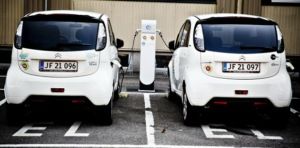News
Europe’s greenest country no good for electric car owners, claims study
This article is more than 3 years old.
As the number of electric vehicles in the country has increased rapidly, a new study suggests that Denmark is not actually a great place to be an electric vehicle owner

The number of electric and hybrid cars in the country more than doubled from 2020 to 2021 (photo: Dansk Energi)
Denmark is one of the worst European countries for owning an electric vehicle, claims a new study by Uswitch – the UK-based price comparison service.
Despite having more electric vehicles registered than it has square kilometres of land, the country ranked 29th among the 33 countries evaluated for electric vehicle compatibility.
Iceland, Greece, Cyprus, and Ireland completed the bottom five. The Netherlands came in first, followed by Croatia, Slovakia, Latvia and Hungary.
Charging cost
According to Uswitch, electric vehicle owners in Denmark pay €640.83 to charge their vehicles every year – by far the highest of any country in Europe, including Denmark’s Nordic neighbours.
Turkey was the most affordable country for charging, with electric vehicle owners there paying an average of €164.49 a year.
It also cost less than €200 a year to charge an electric vehicle in the Netherlands, Hungary, Estonia and Romania.
Charging availability
Denmark similarly scored low in terms of infrastructure. According to the study, an average of 10.13 electric vehicles shared each charging point in the country, compared to 1.47 in Croatia, 2.3 in Slovakia, and 2.8 in the Netherlands.
Denmark also neared the bottom of the list when it came to the availability of high-speed charging stations. Only 0.01 percent of charging stations in the country were high-speed, reported the study.
No country exceeded the 1 percent mark, but Latvia came closest at 0.7 percent.
Denmark trying to keep up
The results of the Uswitch survey come as Denmark has struggled to keep the pace of infrastructure development in line with skyrocketing electric vehicle demand.
The number of public access electric car charging points increased by 68 percent from 2020 to 2021 but, at the same time, the number of electric and hybrid cars in the country more than doubled.
In 2022, the push to expand electric vehicle infrastructure has continued. Last month, for example, Copenhagen Municipality decided to eliminate 5,000 parking spaces for petrol and diesel cars and replace them with 4,100 electric vehicle charging spaces, as well as 900 car-share parking spaces.










































